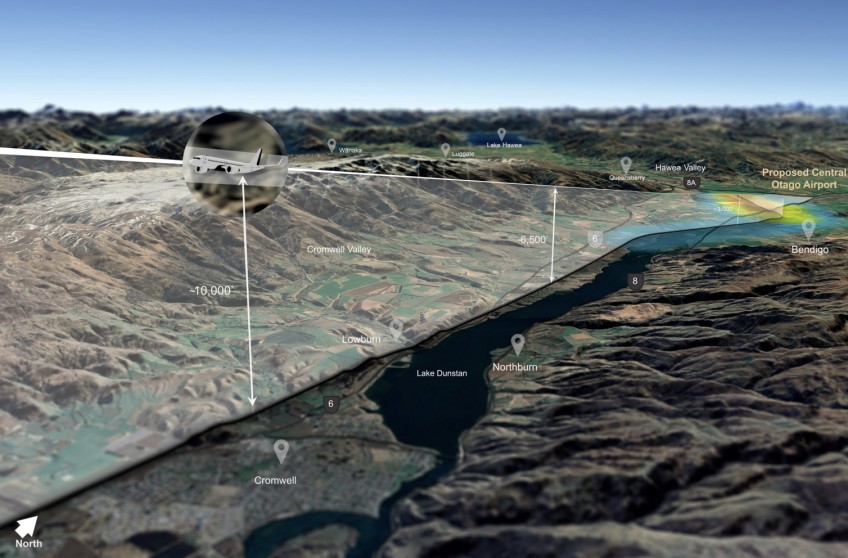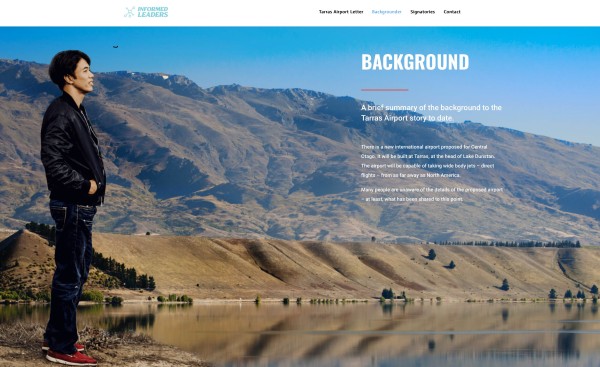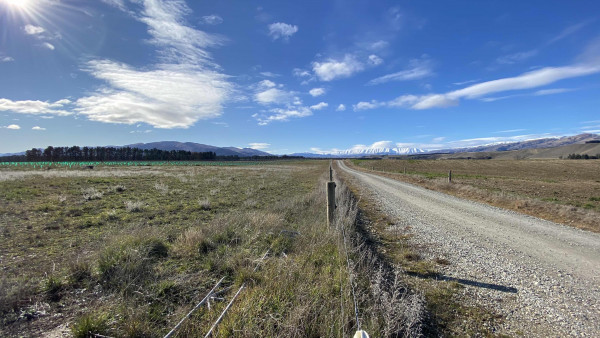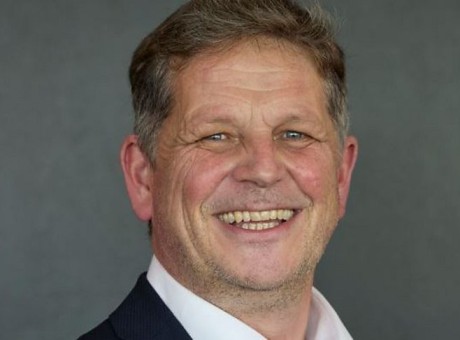Academic heavy-hitters want Tarras Airport plans shelved

There’s a new strong voice opposing plans for an international airport at Tarras – eleven leading academics from six Kiwi universities say the project should be shelved.
But Christchurch Airport’s Michael Singleton, who’s heading the Central Otago airport project, says the group’s assessment is “premature”.
The researchers have written an open letter to business leaders and politicians saying the proposed airport “should not proceed”, as it runs against prevailing research.
The group’s been brought together by James Higham, a professor of sustainable tourism at the University of Otago.
“Given the available research and data - and there is plenty of it - it makes no sense whatsoever to build a new airport at Tarras - or anywhere else in New Zealand for that matter.”
He says to do so “would be wrong”.

They've formed under the moniker of 'Informed Leaders' and this group of leading researchers from New Zealand universities is calling for a 'national conversation' about new airports - including that planned for Tarras.
Top of the group’s concerns: where a new airport fits in a culture of climate responsibility.
"New Zealand has committed to substantially reducing its carbon emissions," the letter says.
“We are concerned that any organisation, let alone Christchurch International Airport Ltd which is owned 25 percent by the government and 75 percent by Christchurch City Council, would consider building a new airport in New Zealand during a climate emergency.”
The group’s argument is backed by attributable data – 12 percent of New Zealand’s gross CO2 emissions come from aviation, and the country’s the sixth highest emitter of aviation emissions per capita in the world, it says.
Another issue: the future of tourism and whether it even relies on more planes and more passengers.
“It is now widely accepted that the New Zealand tourism industry must move away from the volume-based high growth approach that underpins the Tarras Airport proposal,” the letter says.
The future of tourism will be focussed on quality over quantity, with the local industry aiming for longer stays, higher value and deeper engagement, it says.
It’s the sort of visitor experience backed by the Government and outlined in both Queenstown Lakes and Central Otago’s new destination management plans, developed with plenty of buy-in from tourism operators.
However, Christchurch Airport says it’s wrong of the researchers to assume its plans are driven solely by long haul tourism.
“That is not and never has been the case,” Mr Singleton says.
Any Central Otago airport will serve a range of people – local residents and exporters among them, he says.
“Airport infrastructure in Central Otago is reaching its capacity. One way or another a long term solution must be found to ensure the forecast demands of the region can be met in the most effective way.”

'Any call to put a stay on our project before its benefits and impacts can be properly assessed is premature': CIAL project leader Michael Singleton.
The airport’s long pushed the sustainability credentials of its business, and it continues to do so with its Tarras proposal, in contrast to the research presented by the academics in this week’s letter.
“We believe a new airport can fit within New Zealand’s emissions targets and meet the challenges posed by a changing climate,” Mr Singleton says.
“We remain committed to fully exploring that so authorities can make informed decisions around having the right infrastructure in the right place for that future.”
“New Zealand has robust regulatory frameworks that scrutinise infrastructure proposals. Decisions on whether new infrastructure goes ahead should be made within the frameworks that have been established for that purpose.
“No project, including our own, is likely to be given approval if it fails to demonstrate how it will address its impacts and fit into a low emissions future.”
While the researchers challenge the industry's timeframes for decarbonising aviation, saying they're "not sufficiently ambitious" and "based on technologies that do not yet exist", Mr Singleton says their assumptions are wrong.
“We have a more optimistic view. For example both Air New Zealand and Sounds Air are planning to have zero emission flights within this decade. For long-term projects like ours – now is the time to plan for that.”
Mr Singleton says he’s read the letter and welcomes the perspectives, but points out the Central Otago project is in its early stages.
"Any call to ‘put a stay’ on our project before its benefits and impacts can be properly assessed is premature.”

This week's open letter by top Kiwi researchers opposing the planned Tarras Airport raises concerns about the potential negative impacts on flora and fauna, and the wellbeing of local and regional communities.
The letter, sent on Tuesday, has been signed by professors from Otago, Canterbury, Lincoln, Victoria, Massey and Auckland Universities. Signatories include Distinguished Professor Dame Anne Salmond and Professor Shaun Hendy.
Their areas of expertise span the fields of business, economics, climate science, sustainability, Māori and indigenous studies, tourism, the environment, agriculture, and policy studies.
Professor Higham says the group is now working on a curated index of existing, relevant research that should inform the wider conversation.
“Decisions to proceed with projects like this with the potential for significant, intergenerational impacts should not be made in isolation by individual companies.
“The available research and data should be factored in, discussed openly with stakeholders and key communities.”
He says he and others are calling for a “national conversation” about new airports.
The letter, as well as details of the signatories, can be read at www.informedleaders.com

























